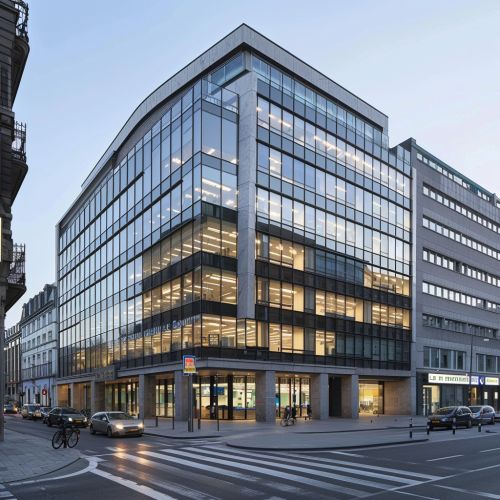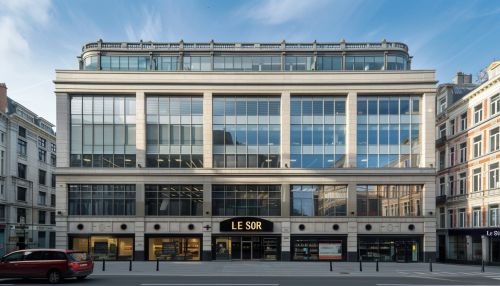Le Soir: Difference between revisions
(Created page with "== Overview == '''Le Soir''' is a prominent French-language daily newspaper published in Brussels, Belgium. Established in 1887, it has become one of the most influential and widely read newspapers in the country, providing comprehensive coverage of national and international news, politics, culture, and more. The newspaper is known for its in-depth reporting, analytical articles, and commitment to journalistic integrity. == History == === Founding and Early Years ==...") |
No edit summary |
||
| Line 37: | Line 37: | ||
The science and technology section of Le Soir covers the latest advancements and discoveries in various fields. Articles often delve into complex scientific topics, making them accessible to a general audience while maintaining a high level of detail and accuracy. | The science and technology section of Le Soir covers the latest advancements and discoveries in various fields. Articles often delve into complex scientific topics, making them accessible to a general audience while maintaining a high level of detail and accuracy. | ||
[[Image:Detail-91387.jpg|thumb|center|Exterior view of Le Soir newspaper office building in Brussels.|class=only_on_mobile]] | |||
[[Image:Detail-91388.jpg|thumb|center|Exterior view of Le Soir newspaper office building in Brussels.|class=only_on_desktop]] | |||
== Digital Transformation == | == Digital Transformation == | ||
Latest revision as of 12:21, 21 June 2024
Overview
Le Soir is a prominent French-language daily newspaper published in Brussels, Belgium. Established in 1887, it has become one of the most influential and widely read newspapers in the country, providing comprehensive coverage of national and international news, politics, culture, and more. The newspaper is known for its in-depth reporting, analytical articles, and commitment to journalistic integrity.
History
Founding and Early Years
Le Soir was founded by Émile Rossel on December 17, 1887. Initially, it was conceived as an evening newspaper, which is reflected in its name, "Le Soir," meaning "The Evening" in French. The newspaper quickly gained popularity due to its accessible language and focus on current events, catering to the growing literate population of Belgium.
World War I and II
During World War I, Le Soir faced significant challenges, including censorship and the occupation of Belgium by German forces. Despite these obstacles, the newspaper continued to publish, albeit under strict regulations. The situation was similar during World War II, when Le Soir was forced to operate under German censorship. The period of occupation saw the newspaper being used as a propaganda tool by the Nazis, leading to a temporary loss of credibility post-war.
Post-War Period
After the liberation of Belgium, Le Soir underwent a period of restructuring and re-establishment of its editorial independence. The newspaper regained its reputation for reliable and unbiased reporting. The post-war era also saw the introduction of new sections and a broader range of topics, including culture, science, and technology.
Editorial Stance and Content
Le Soir is known for its centrist editorial stance, often providing balanced perspectives on political and social issues. The newspaper covers a wide array of topics, including:
National and International News
Le Soir provides extensive coverage of both national and international news. The newspaper has correspondents stationed around the world, ensuring timely and accurate reporting on global events. Key areas of focus include European Union politics, international conflicts, and economic developments.
Politics
Political reporting is a cornerstone of Le Soir's content. The newspaper offers in-depth analysis of Belgian politics, including government policies, elections, and legislative developments. It also provides comprehensive coverage of European and international political affairs.
Culture and Arts
Le Soir has a dedicated section for culture and arts, featuring articles on literature, music, theater, and visual arts. The newspaper regularly reviews new books, films, and exhibitions, and provides insights into cultural trends and movements.
Science and Technology
The science and technology section of Le Soir covers the latest advancements and discoveries in various fields. Articles often delve into complex scientific topics, making them accessible to a general audience while maintaining a high level of detail and accuracy.


Digital Transformation
In response to the changing media landscape, Le Soir has embraced digital transformation. The newspaper launched its online edition in the early 2000s, providing readers with digital access to its content. The website features multimedia elements, including videos, podcasts, and interactive graphics, enhancing the reader experience.
Subscription Model
Le Soir operates on a subscription-based model for its digital content. While some articles are available for free, premium content requires a subscription. This model has helped the newspaper maintain financial stability in an era where many print publications are struggling.
Mobile Applications
To cater to the growing number of mobile users, Le Soir has developed mobile applications for both iOS and Android platforms. These apps provide real-time news updates, personalized content, and offline reading capabilities.
Influence and Impact
Le Soir has had a significant impact on Belgian society and beyond. Its investigative journalism has led to numerous political and social reforms. The newspaper's commitment to ethical journalism has earned it a loyal readership and numerous awards.
Challenges and Criticisms
Like many traditional newspapers, Le Soir faces challenges such as declining print circulation and competition from digital media. Additionally, the newspaper has faced criticism for perceived biases in its reporting, although it strives to maintain a balanced editorial stance.
